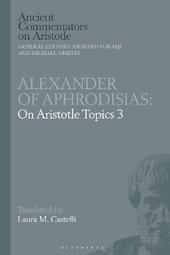
|
Alexander of Aphrodisias: On Aristotle Topics 3
Paperback / softback
Main Details
Description
Aristotle's Topics is a handbook for dialectic, i.e. the exercise for philosophical debates between a questioner and a respondent. Alexander takes the Topics as a sort of handbook teaching how to defend and how attack any philosophical claim against philosophical adversaries. In book 3, Aristotle develops strategies for arguing about comparative claims, in which properties are said to belong to subjects to a greater, lesser, or equal degree. Aristotle illustrates the different argumentative patterns that can be used to establish or refute a comparative claim through one single example: whether something is more or less or equally to be chosen or to be avoided than something else. In his commentary on Topics 3, here translated for the first time into English, Alexander of Aphrodisias spells out Aristotle's text by referring to issues and examples from debates with other philosophical school (especially: the Stoics) of his time. The commentary provides new evidence for Alexander's views on the logic of comparison and is a relatively neglected source for Peripatetic ethics in late antiquity. This volume will be valuable reading for students of Aristotle and of the developments of Peripatetic logic and ethics in late antiquity.
Author Biography
Laura M. Castelli is Assistant Professor in Classics (Greek and Roman Philosophy), Faculty of Classics, University of Cambridge, UK.
|